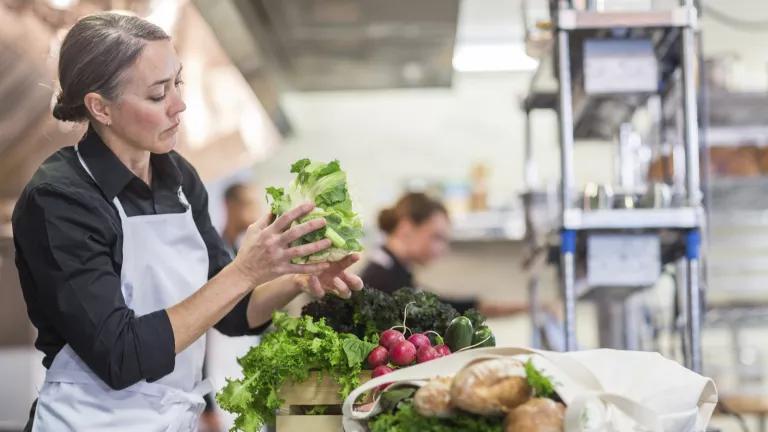
Today, NRDC, along with the Center for Food Safety, Consumers Union, Food Animal Concerns Trust, and Friends of the Earth, released Chain Reaction II, our second annual scorecard and report ranking the nation’s 25 largest fast food and fast casual restaurant chains on their antibiotics use policies and practices for sourcing meat and poultry. This year, one trend stands out among the signs of progress in this industry on antibiotics use: the number of restaurant chains with passing grades doubled compared to last year. This is mostly due to movement on the part of multiple top restaurant chains to put chicken raised without medically-important antibiotics on their menus.
Against this backdrop of leadership, chicken giant KFC officially stands out as an industry laggard. The company is still failing to do its part to protect people from antibiotic-resistant superbugs, earning a failing grade two years in a row while its competitors—Subway, Chick-fil-A, McDonald’s, Wendy’s, and Taco Bell—pass them by, committing to prohibit the routine use of antibiotics in their chicken supply and making real progress in implementing that policy.
Just last month, 350,000 concerned consumers signed petitions calling for KFC to end the routine use of antibiotics important to human medicine in their chicken supply. My colleague Lena Brook personally delivered these petitions to KFC’s headquarters in Louisville, Kentucky. This public call to action was met with silence.
KFC—as the largest and most iconic chicken restaurant in the US—has a particular responsibility to clean up its antibiotics policies. As Chain Reaction II spotlights, rival McDonald’s has already succeeded in transitioning its entire chicken supply chain away from a reliance on medically-important antibiotics, seven months ahead of schedule. Subway, Chick-fil-A, Wendy’s, and even Taco Bell, KFC’s sister company within Yum! Brands, are each well on their way to implementing their chicken policies. KFC’s lack of action on antibiotics misuse in its chicken supply poses a threat to our health, to communities, and to KFC’s brand reputation. Meanwhile, while KFC is abdicating its responsibility on one of the world’s greatest health threats, they did manage to bring the world something it truly doesn’t need: chicken-flavored sunscreen!
NRDC now estimates that approximately 40 percent of the U.S. chicken industry has eliminated or pledged to eliminate routine use of medically-important antibiotics. This includes commitments by Perdue Farms, Tyson Foods, and Foster Farms to eliminate routine antibiotics use across all of their chicken, as well as a smaller commitment from Pilgrim’s Pride to raise a quarter of its chickens without antibiotics by 2019. As a major U.S. chicken buyer, KFC could single-handedly tip the industry over the 50% mark—what a remarkable opportunity for the company!
More than 70 percent of medically-important antibiotics in the U.S. sold for use to raise the chickens, turkeys, pigs and cows that end up on our plates, the vast majority routinely distributed in feed or water, often to animals that are not sick. That means reforming the misuse of antibiotics in the meat industry is a critical part of keeping antibiotics working for us and our children. Voluntary efforts in the restaurant sector are a critical part of the solution and changes in the chicken industry are a case in point.
We now need the same kind of progress in other parts of the livestock industry. A key finding of Chain Reaction II is that top restaurant companies have made very little progress on pork and beef. There are no new entrants into the small peer group of chains receiving an “A” grade because they not only have policies limiting the routine use of antibiotics across all the meat and poultry they serve, but publicly affirm that the majority of all their meat and poultry is sourced accordingly. But Subway is knocking on the door. Subway is the only restaurant chain to adopt a new antibiotics policy that applies to all types of meat it serves, leaping from an “F” last year to a “B” grade in this year’s scorecard. The company has not yet, however, begun implementing its policy on pork, beef or turkey.
We also know that the market alone can’t solve the health crisis of antibiotic resistance. For that we need the Food and Drug Administration to set rules across the industry that prohibit the routine use of antibiotics in food animal production for growth promotion and disease prevention, and set baseline standards that limit acceptable use to treatment of sick animals and to control identified disease outbreaks. We’ve seen some government action, in particular at the state level in California, but just as in the fast food industry, much more work remains to be done.
In the meantime, our hope is the Chain Reaction continues to serve as an important tool to help consumers and media identify companies that are providing real leadership in the fight to protect these critical medicines. KFC: we’re waiting for you!



